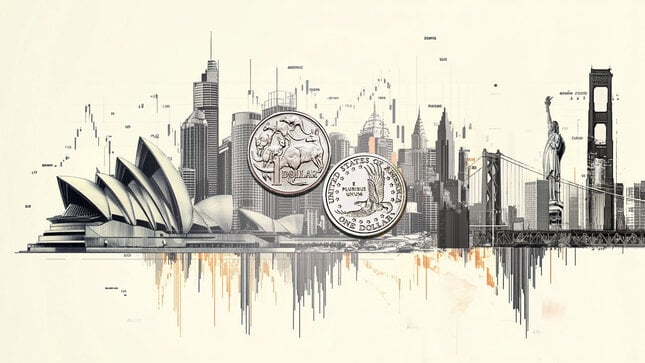USD/CAD Forecast and News
USD/CAD weakens to near 1.3650 amid partial US shutdown, trade policy concerns
The USD/CAD pair trades in negative territory near 1.3660 during the early Asian session on Tuesday. Another US government shutdown undermine the US Dollar against the Canadian Dollar. Nonetheless, the downside for the pair might be limited amid upbeat US economic data.
Latest Canadian Dollar News
USD/CAD Technical Overview
Fundamental Overview
Latest CAD Analysis
Editors' picks

AUD/USD holds firm above 0.7000 after China's RatingDog Services PMI
AUD/USD holds higher ground above 0.7000 in Asian trading on Wednesday, supported by the upside surprise in the Chinese RatingDog Services PMI data for January. The Aussie preserves the hawkish RBA-inspired gains, with further upside likely capped by a slight deterioration in risk sentiment.

USD/JPY advances above 156.00 as fiscal, political woes weigh on JPY
USD/JPY trades with a positive bias for the fourth straight day on Wednesday and looks to build on a one-week-old uptrend above 156.00. Concerns about Japan's fiscal health and political uncertainty counter hawkish BoJ expectations, undermining the Japanese Yen ahead of the February 8 snap election, while boosting the pair. However, a softer risk tone could limit losses for the safe-haven JPY and cap the pair amid subdued US Dollar price action.

Gold extends recovery toward $5,050 as US-Iran tensions boost haven demand
Gold price builds on the previous recovery toward $5,050 in the Asian session on Wednesday. The precious metal extends the rebound after a historic and volatile sell-off last week. Traders weigh the next round of US economic signals amid a resurgent demand for safe-haven assets and renewed US-Iran geopolitical tensions.

Why is the crypto market crashing?
Bitcoin and the broader crypto market are experiencing a heavy downturn on Tuesday amid negative sentiment following the latest tech earnings. The top crypto briefly declined more than 5% over the past 24 hours, sliding below $73,500 before quickly recovering above $75,000 at the time of publication. Over the past two weeks, Bitcoin has lost more than 23%, eroding about $401 billion in market capitalization.

Gold and silver recovery continues, but equities sink as tech is shunned
The risk recovery is on pause as we move through Tuesday. After signs that a recovery in precious metals could boost overall risk appetite earlier today, a nasty sell off in tech stocks has pushed the Nasdaq and the S&P 500 down by 1.7% and 1.1% respectively.
Majors
Cryptocurrencies
Signatures
USD/CAD YEARLY FORECAST
How could USD/CAD move this year? Our experts make a USD/CAD update forecasting the possible moves of the Canadian dollar (CAD) - US dollar (USD) pair during the whole year. Don't miss our 2025 USD/CAD forecast!
USD/CAD 2025 FORECAST
In the USD/CAD 2025 Forecast, FXStreet analyst Joshua Gibson suggests uncertainty and risk-off sentiment could strengthen the US Dollar (USD) early in 2025, while the Canadian Dollar (CAD) is expected to weaken in the first quarter. However, CAD investors may reassess prospects as the year progresses, focusing on the Federal Reserve (Fed) - Bank of Canada (BoC) policy dynamics.
From a technical point of view, USD/CAD could face a technical ceiling near the 1.4400 level after the Canadian Dollar's sharp 8.5% decline in 2024 sent the pair to 56-month highs. However, technical indicators like the MACD suggest caution, as short positions may only become viable once clear sell signals emerge, likely during the first quarter.
MOST INFLUENTIAL FACTORS IN 2025 FOR USD/CAD
The year will be politically marked by Trump’s return to the White House. A Republican government is seen as positive for financial markets, but Trump’s pledge to cut taxes and impose tariffs on foreign goods and services may introduce uncertainty to both the political and economic landscape.
Canada’s political crisis peaked in late 2024 with a no-confidence vote against Prime Minister Justin Trudeau, leading to snap elections and a weakened Liberal minority government. Policy uncertainty and economic challenges dominate 2025’s outlook, raising concerns over market stability and investor confidence.
The BoC is set to continue easing interest rates through 2025, at least at a faster pace than the Fed is expected to, which could apply pressure on CAD’s already-rising rate differential.
INFLUENTIAL ORGANIZATIONS AND PEOPLE FOR THE USD/CAD
Bank of Canada (BoC)
The Bank of Canada (BoC) is the nation's central bank. Its principal role, as defined in the Bank of Canada Act, is "to promote the economic and financial welfare of Canada." The bank's responsibilities are divided into four main areas:
-
Monetary policy: The bank influences the supply of money in the economy, using its monetary policy framework to keep low and stable inflation.
-
Financial system: The bank promotes safe, sound, and efficient financial systems within Canada and internationally, conducting transactions in financial markets to support these objectives.
-
Currency: The bank designs, issues, and distributes Canada's banknotes.
-
Funds management: The bank is the fiscal agent for the Government of Canada, managing its public debt programs and foreign exchange reserves.
The Bank of Canada (BoC) sets interest rates and manages monetary policy at eight scheduled meetings a year and ad hoc emergency meetings that are held as required. The BoC's primary mandate is to maintain price stability, which means keeping inflation at between 1-3%. Its main tool for achieving this is by raising or lowering interest rates. Relatively high interest rates will usually result in a stronger Canadian Dollar (CAD) and vice versa. Other tools used include quantitative easing and tightening.
The official website, on X and YouTubeThe Federal Reserve (Fed)
The Federal Reserve (Fed) is the central bank of the United States (US) and it has two main targets: to maintain the unemployment rate at its lowest possible levels and to keep inflation around 2%. The Federal Reserve System's structure is composed of the presidentially appointed Board of Governors and the partially appointed Federal Open Market Committee (FOMC). The FOMC organizes eight scheduled meetings in a year to review economic and financial conditions. It also determines the appropriate stance of monetary policy and assesses the risks to its long-run goals of price stability and sustainable economic growth. The FOMC Minutes, which are released by the Board of Governors of the Federal Reserve weeks after the latest meeting, are a guide to the future US interest-rate policy.
Fed official website, on X and FacebookJerome Powell
Jerome Powell took office as chairman of the Board of Governors of the Federal Reserve System in February 2018, for a four-year term ending in February 2022. He was sworn in on May 23, 2022, for a second term as Chairman ending May 15, 2026. Born in Washington D.C., he received a bachelor’s degree in politics from Princeton University in 1975 and earned a law degree from Georgetown University in 1979. Powell served as an assistant secretary and as undersecretary of the Treasury under President George H.W. Bush. He also worked as a lawyer and investment banker in New York City. From 1997 through 2005, Powell was a partner at The Carlyle Group.
Jerome Powell Fed's Profile and
Wikipedia
Tiff Macklem
Tiff Macklem was born in Montreal, Quebec, in 1961. He was appointed Governor of the Bank of Canada effective June 3, 2020, for a seven-year term. He graduated from Queen's University with a bachelor's degree in economics and completed a master's degree and a PhD in economics, both from the University of Western Ontario.
Before becoming Governor, Macklem served as a director of the Bank of Nova Scotia and chair of its risk committee. He is chair of the Group of Governors and Heads of Supervision, the oversight body of the Basel Committee on Banking Supervision, and co-chair of the Financial Stability Board's Regional Consultative Group for the Americas.
Macklem's BOC's profile and Wikipedia
BOC NEWS & ANALYSIS
FED NEWS & ANALYSIS
About USD/CAD
THE IMPORTANCE OF OIL FOR THE ‘LOONIE’
The USD/CAD is one of the three "commodity pairs", alongside AUD/USD and NZD/USD. These pairs are closely tied to commodity price fluctuations, particularly Oil.
Canada, known as a resource-based economy, is a major producer and supplier of Oil. Its leading export market is the United States, making the Canadian dollar (CAD) particularly sensitive to US consumption data and economic health.
Rising Oil prices typically have a negative effect on the USD and a positive effect on the CAD.
ASSETS THAT INFLUENCE USD/CAD THE MOST
- Commodities: As previously mentioned, Oil is the primary focus, but traders should also consider Gold and Natural Gas.
- Currencies: The Japanese Yen (JPY) and the Euro (EUR). Another important group of influent pairs includes: EUR/USD, GBP/USD, USD/JPY, AUD/USD, USD/CHF and NZD/USD.
- Bonds: CSB (Canada Savings Bonds), CPB (Canada Premium Bonds) and T-Note 10Y (10-year US Treasury note).